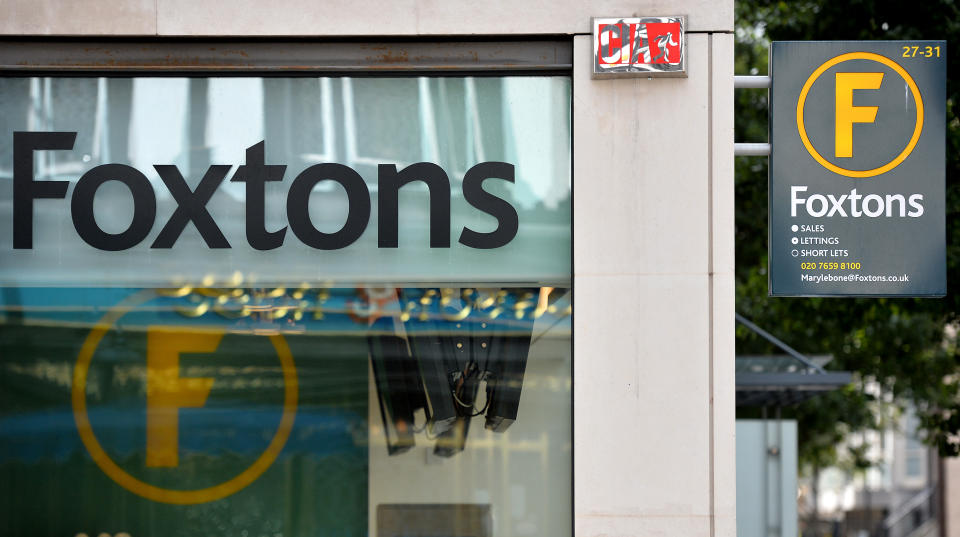What to watch: Foxtons to raise £22m, China's economy shrinks, stocks rise

Here are the top business, market, and economic stories you should be watching today in the UK, Europe, and abroad:
Foxtons hopes to raise £22m from shareholders
London-based estate agent Foxtons (FOXT.L) said on Friday that it hoped to raise £22m ($27m) from its shareholders in order to bolster its balance sheet for a worst-case coronavirus scenario.
The move to tap investors for cash came as Foxtons said that it was sending 1,100 workers home, including by furloughing some 750 workers using the UK government scheme.
The estate agent said that “the vast majority” of its furloughed employees would get 80% of their salaries, The other 350 employees will continue to work from home.
After maxing out its existing credit lines, Foxtons said it would sell an almost 20% stake in the business.
“The London property market has been severely disrupted by the necessary measures the country has taken to contain the COVID-19 pandemic,” said chief executive Nic Budden on Friday.
“Notwithstanding our current strong financial position, the board considers it prudent to raise additional capital at this time to enable the company to maintain liquidity in a reasonable worst-case scenario and preserve vital business capability to support customers when the COVID-19 pandemic subsides,” he said.
China's economy shrinks for the first time since records began
China’s economic output shrank at the start of the year as coronavirus tore through the country, marking the first time the Chinese economy has contracted since official records began.
Chinese GDP fell by 6.8% in the first quarter of 2020 when compared with a year earlier, officials said on Friday 17 April. Output shrank by 9.8% when compared with the final three months of 2019.
It marks the first time since China began reporting quarterly growth figures in 1992 that the economy has shrunk. It’s also the first time China has officially acknowledged a year-on-year fall in growth since 1972, according to the Financial Times.
The slump in economic activity follows the outbreak of novel coronavirus at the start of the year.
The current pandemic first began in China in late 2019 and the virus began spreading rapidly in the Chinese city of Wuhan in January 2020.
Efforts to contain the deadly virus led authorities to lockdown Wuhan and other parts of Hubei province in late January.
$10bn hotel startup Oyo asks high earners to take pay cut
Oyo, the SoftBank-backed hotel startup valued at $10bn (£8bn) last year, is tightening its belt further in the UK as the coronavirus lockdown continues to hit the business.
Staff at Oyo’s UK business were told this week that more employees would be furloughed under the government’s job retention scheme. High earners are also being asked to take a temporary pay cut.
UK head Rishabh Gupta said in an email to staff the steps were necessary to “mitigate COVID-19’s impact and ensure long-term success and sustainability of the business despite the economic pressures.”
“Globally, it is the greatest challenge of our generation and nothing of this magnitude has been witnessed for over 100 years since the Spanish Flu epidemic of 1918,” Gupta wrote.
New car registrations in EU plunge by 55% in March
Automotive manufacturers and dealers started to feel the impact from the coronavirus pandemic last month, as the number of new car registrations plunged by 55%.
According to the latest data from the European Automobile Manufacturers Association (ACEA), just 567,308 new cars were registered across the EU in March, as the majority of dealerships were made to close as part of national lockdowns imposed to try and contain the virus.
Out of all 27 EU markets, Italy was worst hit, with registrations plummeting by over 85% compared with the same month a year ago. France and Spain were close behind, recording a 72% and 69% drop respectively.
Germany, the automotive heart of the EU, fared slightly better, but still suffered a nearly 38% drop in new car registrations.
For the first quarter of 2020, demand for new cars slid by more than 25% in the EU, again with Italy, France, and Spain worst affected.
European stocks rise as Trump unveils plan to reopen US states
European stocks rose on Friday after US president Donald Trump told governors that they could choose to lift coronavirus restrictions in 14-day phases, giving investors hope that the world’s largest economy would begin to reopen.
“America wants to be open and Americans want to be open,” Trump said late on Thursday. “A national shutdown is not a sustainable long-term solution.”
The pan-European STOXX 600 index (^STOXX) was up by around 2.5%. London’s FTSE 100 (^FTSE) rose by more than 2.9%.
Germany’s DAX (^GDAXI) climbed by 3.1%, while France’s CAC 40 (^FCHI) was 3.4% in the green.
Though the set of non-binding guidelines unveiled by Trump suggested that the US would return to work slowly over the course of several weeks and months, they give markets some sort of a roadmap as to how lockdowns could be eased across the country.
What to expect in the US
Futures were pointing to a higher open for US stocks on Friday.
S&P 500 futures (ES=F) rose by around 2.6%, Dow Jones Industrial Average futures (YM=F) were up by 2.9%, while Nasdaq futures (NQ=F) were up by around 1.9%.


